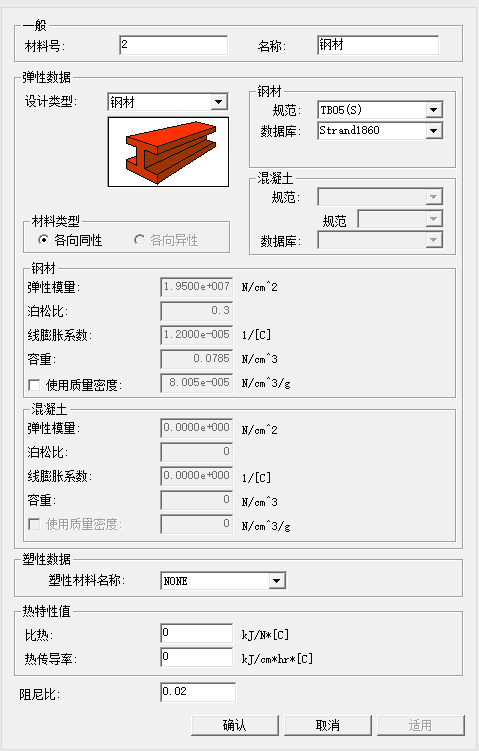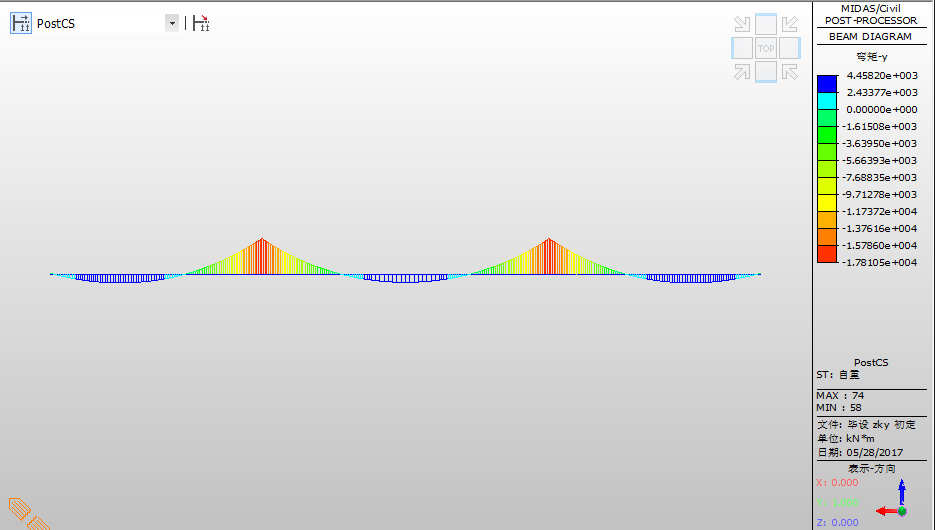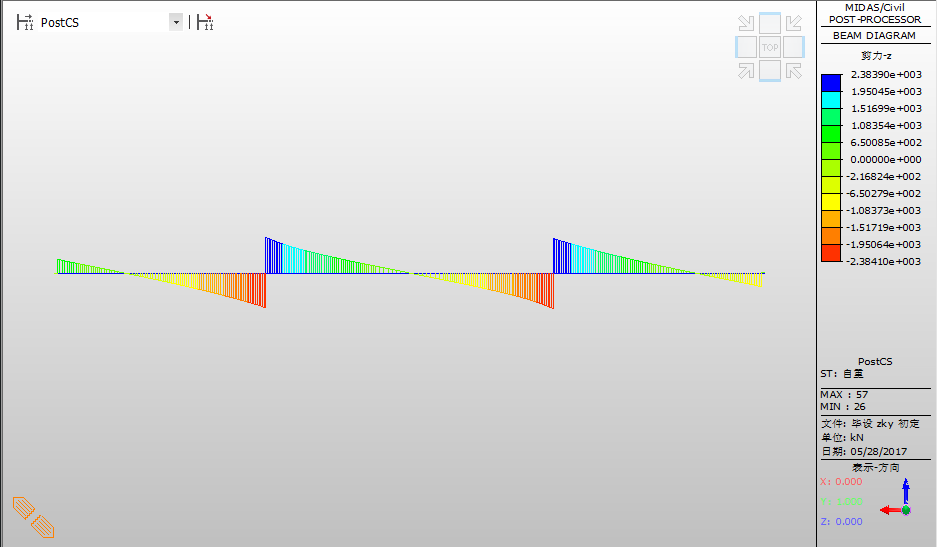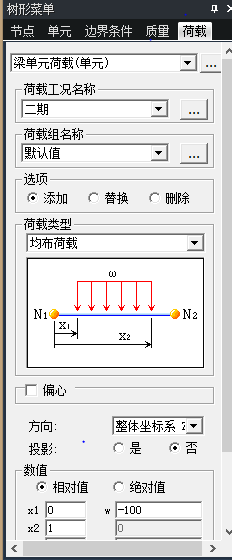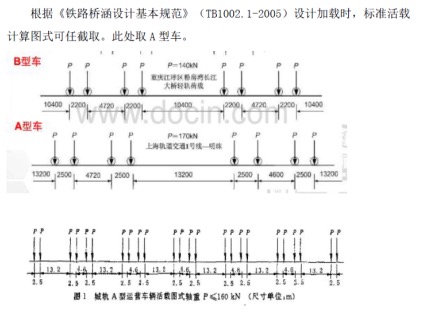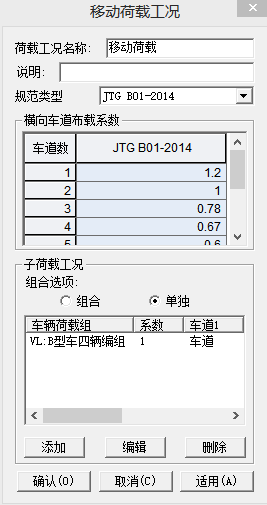32 40 32m预应力混凝土单线变高度连续梁桥设计毕业论文
2020-06-19 22:18:45
摘 要
本设计是一座跨径为 30 42 30m 的普通铁路预应力混凝土连续梁桥的设计。
全桥采用三跨预应力混凝土变高度变截面连续梁结构,线路形式为单线;箱梁梁高呈二次抛物线变化,中支点处梁高为3.2m,跨中处梁高为1.8m;考虑到抗弯刚度及抗扭刚度的影响,梁体采用单箱单室箱型截面,桥面宽度为5.2m,梁底宽度1.3m,均采用支架现浇。
设计过程如下:首先,汇总说明了本设计的设计依据和设计基本资料;重点论述了桥梁方案设计、施工阶段的划分以及梁体结构尺寸的拟定。其次,通过 Midas/Civil 有限元分析软件,建立简单、合理的有限元模型,分析梁体的受力行为;并在内力组合下进行了预应力筋的估算,以及预应力筋的配置;同时模型考虑了梁体在温度、基础不均匀沉降引起的次内力效应。最后,对各控制截面进行了强度、抗裂性、应力验算,各项检算均满足设计要求。
关键词:Midas 结构设计 连续梁桥 内力计算
Design of 32 40 32m prestressed concrete single line variable height continuous girder bridge
Abstract
This design is a design of a conventional railway prestressed concrete continuous beam bridge with a span of 30 42 30 m.
The whole bridge adopts three-span prestressed concrete variable height continuous section continuous beam structure, the line form is single line; box girder beam is quadratic parabolic change, the middle fulcrum beam height is 3.2m, the middle beam height is 1.8m; consider To the bending stiffness and torsional rigidity of the impact of the use of single-box single-box box section, bridge width of 5.2m, beam width of 1.3m, are used in the cast.
The design process is as follows: Firstly, the design basis and design basic information of the design are summarized. The design of the bridge scheme, the division of the construction stage and the development of the structure of the beam are mainly discussed. Secondly, through the finite element analysis software of MIDAS / Civil, a simple and reasonable finite element model is established to analyze the behavior of the beam. The estimation of the prestressing tendons and the configuration of the prestressing tendons are carried out under the combination of internal forces. The internal force effect of the beam caused by temperature, foundation uneven settlement, preloading, concrete shrinkage and creep is considered. Finally, the stress effect under the influence of several main combinations in the internal force combination is viewed, and the structural design of the beam structure is carried out according to the specification, including the strength of the construction stage and the operation stage.
Key words: Midas;Structural design;Continuous beam bridge;Internal force calculation
目 录
摘 要 I
Abstract II
第一章 绪论 1
1.1 桥梁概述 1
1.1.1 预应力混凝土连续梁桥概述 1
1.1.2 预应力混凝土连续梁的特点 1
1.2 毕业设计的目的和意义 1
1.2.1 毕业设计的目的 1
1.2.2 毕业设计的意义 2
第二章 桥跨总体布置和结构主要尺寸 3
2.1 设计概述 3
2.2 截面尺寸拟定 3
2.2.1 截面设立 3
2.2.2 主梁梁高 3
2.2.3 顶板和底板厚度 4
2.2.4 腹板厚度 4
2.2.5 横隔板 5
2.2.6 承托(梗腋) 5
第三章 结构内力计算 7
3.1 有限元模型的建立 7
3.1.1 模型建立原则 7
3.1.2 结构模型 7
3.2 恒载内力计算 9
3.2.1 材料 9
3.2.2 边界条件 11
3.2.3 主梁自重 12
3.2.4 二期恒载自重 14
3.3 活载内力计算 16
3.3.1 列车活载在Midas/Civil中的输入 17
3.3.2 主梁在活载作用下的内力结果 19
3.4次内力的计算 21
3.4.1 温度荷载 22
3.4.2 基础沉降 28
3.5 内力组合 31
3.5.1 荷载分类 31
3.5.2 荷载分项系数 32
3.5.3 内力组合在Midas/Civil中的输入 32
3.5.4 主梁在最不利荷载组合作用下的内力结果 33
第四章 预应力筋的布置 36
4.1 预应力筋的估算 37
4.2 预应力筋布置原则 41
4.2.1纵向预应力束的布置 42
4.2.2 竖向预应力钢束布置 42
4.2.3 横向预应力钢束布置 42
4.2.4 普通钢筋的布置 43
第五章 预应力损失及有效预应力 44
5.1 管道摩阻损失 45
5.2 锚具变形损失 46
5.3 混凝土弹性压缩损失 46
5.4 预应力钢筋应力松弛损失 46
5.5 混凝土的收缩徐变损失 47
5. 6 关键截面预应力损失计算 48
第六章 主梁截面验算 50
6.1 强度验算 51
6.1.1 正截面强度验算 51
6.1.2 斜截面强度验算 53
6.2 抗裂验算 55
6.2.1 正截面抗裂验算 55
6.2.2 斜截面抗裂验算 57
6.3 应力验算 58
6.3.1 混凝土压应力 58
6.3.2 正截面混凝土拉应力 60
6.3.3 混凝土剪应力 61
参考文献 62
毕业设计总结 63
致谢 65
第一章 绪论
1.1 桥梁概述
1.1.1 预应力混凝土连续梁桥概述
连续梁是一种古老的结构体系,它具有变形小、结构刚度好、行车平顺舒适、 伸缩缝少、养护简单、抗震能力强等优点。在20世纪50年代以前,预应力混凝土连 系梁虽然是常被采用的一种体系,但跨径均在百米以下。当时主要采用满堂支架施工,费工费时,限制了它的发展。50年代后,预应力混凝土桥梁采用平衡悬臂施工方法后,加速了它的发展步伐,跨度开始突破100米。虽然跨径太大时是用预应力结构并不总比其它结构好,但是在实际过程中,跨径小于400米时,预应力混凝土桥常常为优胜方案。
1.1.2 预应力混凝土连续梁的特点
(1)预应力混凝土充分发挥高强度材料的特性,具有可靠的强度、刚度及抗裂性能。结构在车辆运行中噪音小,维修工作量少。
(2)预应力混凝土连续梁桥的施工方法已经达到相当先进的水平,现代化技术的应用已使它的施工周期大大缩短,显示出巨大的经济效益。
(3)预应力混凝土桥梁适用于各种结构体系,而且还在不断创造出体现预应力技术特点的新型结构体系,因而它的适用范围大,竞争力强。
相关图片展示:
